Customer Logins
Obtain the data you need to make the most informed decisions by accessing our extensive portfolio of information, analytics, and expertise. Sign in to the product or service center of your choice.
Customer Logins
ECONOMICS COMMENTARY
Jan 10, 2017
Robust UK labour market points to resilient economy at year-end
The UK labour market continued to strengthen at the end of 2016, reviving from the slowdown seen in the aftermath of the Brexit vote. The latest survey of recruitment agencies indicated strongly rising demand for workers, shortages of suitable staff and increasing pay.
Signs of stronger economy
December's REC survey, compiled by Markit, showed a solid rise in the number of people placed in jobs by recruitment agencies for the third successive month, although the rate of increase dipped slightly since November. Revenues received from the employment of temporary and contract staff meanwhile rose at the fastest rate since April.
Economic growth and permanent staff placements
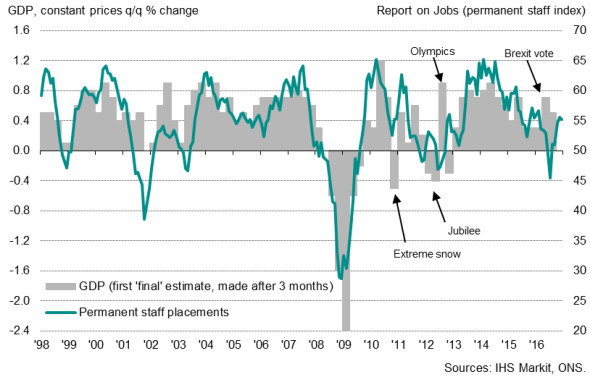
The survey data therefore suggest that employment has revived in the fourth quarter from the soft-patch seen in the four months to September.
Employment
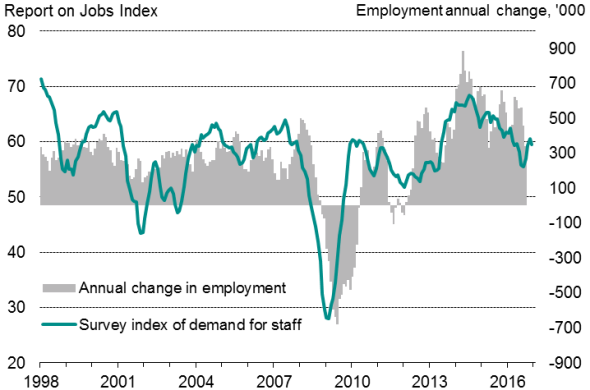
Notably, the survey's index of permanent staff placements acts as a reliable lead-indicator of economic growth, tracking GDP closely in all-but unusual times such as the Olympics. The improvement signalled in the closing months of 2016 points to economic growth of approximately 0.4%.
Agencies reported that demand for staff from employers rose at a marked pace, having likewise slowed in the summer months, reflecting growing workloads.
The survey also suggests that the official employment data should also start to pick up again, after the latest ONS figures showed the number of people employed down by 6,000 in the three months to October, which was the first decline since the spring of 2015.
Recruitment of permanent staff
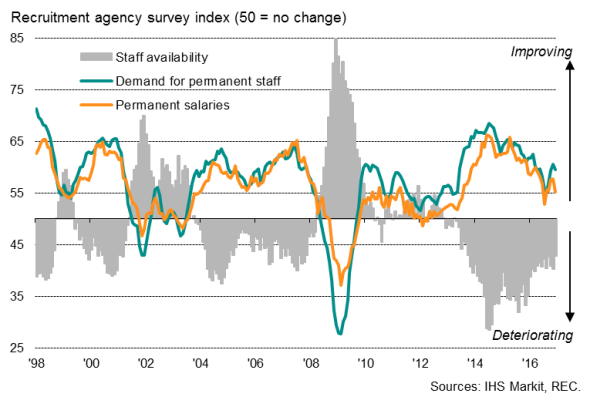
Mixed news on pay
The combination of rising demand for staff and falling availability of suitable workers, linked in turn to historically low unemployment, put further upward pressure on pay in December. Growth of temporary and contract pay rose especially markedly, rising at the fastest rate since last May, though average salaries awarded to people taking up new permanent jobs showed the smallest monthly increase since July.
Staff availability and unemployment
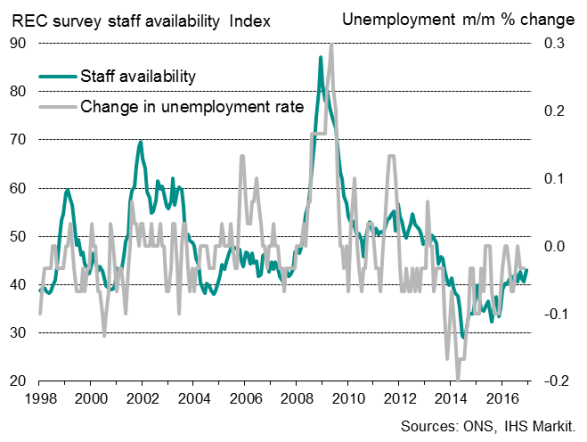
The increase in permanent salaries was in fact one of the weakest seen over the past three-and-a-half years, suggesting that upward pay pressures emanating from the tight labour market, the National Living Wage and rising inflation may be being countered to some extent by a lack of appetite among recruits to negotiate higher pay.
Pay growth
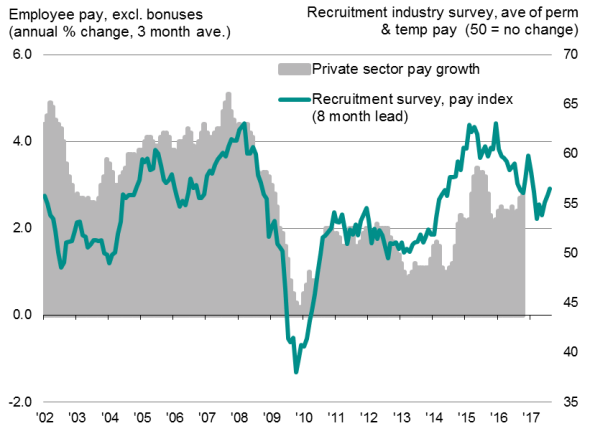
Source: IHS Markit. ONS.
Chris Williamson | Chief Business Economist, IHS Markit
Tel: +44 20 7260 2329
chris.williamson@ihsmarkit.com
{"items" : [
{"name":"share","enabled":true,"desc":"<strong>Share</strong>","mobdesc":"Share","options":[ {"name":"facebook","url":"https://www.facebook.com/sharer.php?u=http%3a%2f%2fwww.spglobal.com%2fmarketintelligence%2fen%2fmi%2fresearch-analysis%2f10012017-economics-robust-uk-labour-market-points-to-resilient-economy-at-year-end.html","enabled":true},{"name":"twitter","url":"https://twitter.com/intent/tweet?url=http%3a%2f%2fwww.spglobal.com%2fmarketintelligence%2fen%2fmi%2fresearch-analysis%2f10012017-economics-robust-uk-labour-market-points-to-resilient-economy-at-year-end.html&text=Robust+UK+labour+market+points+to+resilient+economy+at+year-end","enabled":true},{"name":"linkedin","url":"https://www.linkedin.com/sharing/share-offsite/?url=http%3a%2f%2fwww.spglobal.com%2fmarketintelligence%2fen%2fmi%2fresearch-analysis%2f10012017-economics-robust-uk-labour-market-points-to-resilient-economy-at-year-end.html","enabled":true},{"name":"email","url":"?subject=Robust UK labour market points to resilient economy at year-end&body=http%3a%2f%2fwww.spglobal.com%2fmarketintelligence%2fen%2fmi%2fresearch-analysis%2f10012017-economics-robust-uk-labour-market-points-to-resilient-economy-at-year-end.html","enabled":true},{"name":"whatsapp","url":"https://api.whatsapp.com/send?text=Robust+UK+labour+market+points+to+resilient+economy+at+year-end http%3a%2f%2fwww.spglobal.com%2fmarketintelligence%2fen%2fmi%2fresearch-analysis%2f10012017-economics-robust-uk-labour-market-points-to-resilient-economy-at-year-end.html","enabled":true}]}, {"name":"rtt","enabled":true,"mobdesc":"Top"}
]}




